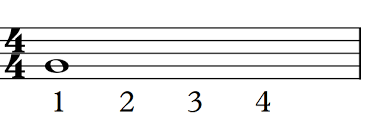Understanding Rhythm
Rythm is the part of music that gets your body moving. It's essentially just the timing in which we hit the notes. You can play
music fast, slow or a combination of both. Usually though, you will decide upon a speed and stick with that for the entirety of the song. The underlying speed of the song is referred to
as the BPM or Beats Per Minute. This number quickly gives you an idea of how fast the song should be played. Once you have the speed of the song figured out the next thing to
think about is the general feel or timing of the song. Music can be played in many different time signatures but most of the music we are used to hearing is in 4/4 or 3/4.
4/4 just means that there are 4 beats in a measure. When looking at a musical stave it will be divided and counted depending on the time signature chosen.

The above image shows basic quarter notes. The timing is 4/4 so we were able to divide both measures 4 times using quarter notes. If we wanted to play 1 note per measure
and have a pause of 3 beats following, it would look like this:

The examples above showed quarter notes and whole notes. There are also half notes, eighth notes, and sixteenths. The notes are named depending on how
they divide the measure. We also have something called a rest which means to not play anything during that beat. The different note lengths help you
understand how long you should hold the note for. This can seem confusing at first but after looking at a few songs and paying attention to how long notes are being held
the concept will begin to fall into place. The most important thing is to start off slow and work your way up to more intricate songs. Once you have a really good idea of rhythm
you can do something like the example below! He is using a mixture of all the different notes lengths and rests.